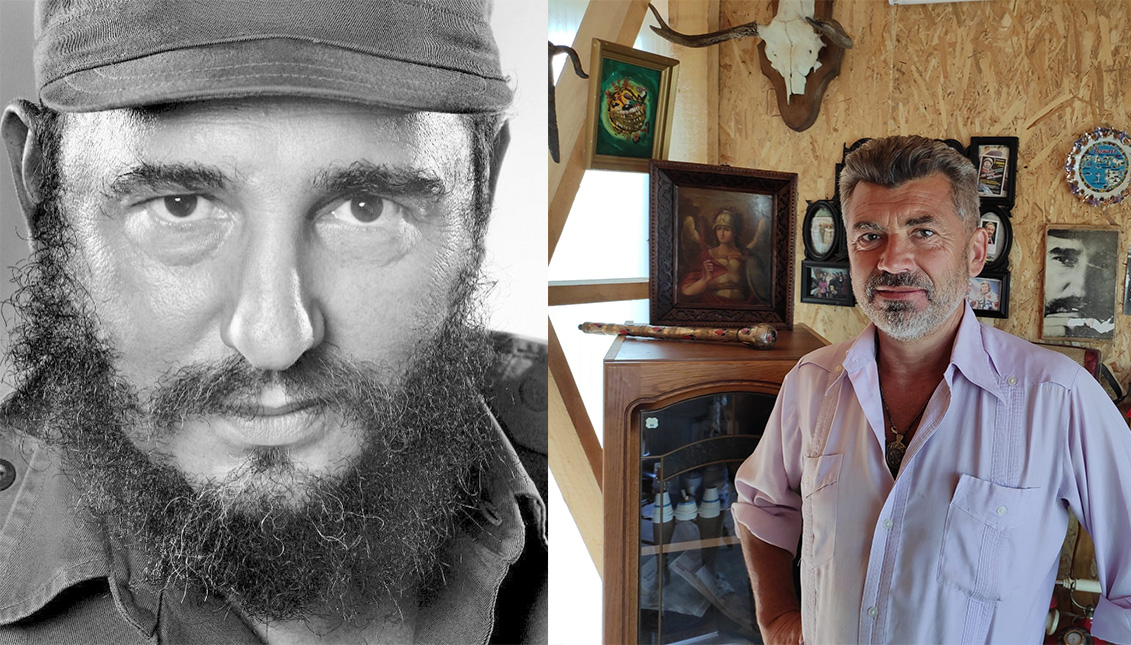
Castro's alleged Russian son helps Cuban migrants from Moscow during the pandemic
His name is Alexandr Serioguin, but he is called "Castro" and wants to create a "world revolution" following in his father's footsteps.
Barbikha is a village on the outskirts of Moscow, famous for having the medical center where most Russian presidents are treated. There are also many luxury residences and villas — an oasis for wealthy Muscovites.
However, the house of Alexandr Serioguin, 57, known as "Castro," has three floors half-built and could pass for a museum of the Cuban leader Fidel Castro, filled with memories: cigars, rum, hundreds of photos and souvenirs.
Alexandr — or Sasha, as his mother called him — has claimed for many years to be the biological son of the Cuban dictator, even though most of the genetic tests he assures to have done so far have been mysteriously lost.
"I've tried to do DNA tests, but they're always lost, or something happens. Television has only tried to do it three times," he tells journalist Natasha Vazquez of On Cuba News.
However, loyal to the legacy of his supposed biological father, the Russian Castro claims to have a duty to his Cuban compatriots.
That is why, during the COVID-19 pandemic, he has welcomed into his home a dozen Cubans who arrived in the country, some in very harsh conditions, and trying to make their way in a Russia that seems to have already forgotten its historical allies.
"The house is big, and no one bothers anyone, there is a place to sleep and something to eat," says the Muscovite, who defines his tenants as "brothers and sisters" and gives them a roof in exchange for fixing up the house. However, he confesses that he is going through financial hardship.
The Russian Castro's mother, Valentina, was a young cook who worked in the house where the Cuban leader stayed on his first visit to the USSR in 1963. Everyone, Alexandr recalls, wanted to see the revolutionary leader, and Valentina was in the front row.
"She asked him if he wasn't afraid of the Americans killing him, and he replied that he was only afraid of his blue eyes," he says. "I was born just nine months after Fidel's stay in Moscow."
RELATED CONTENT
Serioguin always knew that his family had some link to Cuba and Fidel, but nothing more. Until the family moved to Havana, where they lived for several years, and received visits from Castro on at least two occasions.
If he ever found out who his biological father was, it was because a military man told him. Then Valentina had no choice but to tell him the truth, he states.
When the dictator became ill, Alexandr tried to communicate with him as Fidel had been doing with his mother "for many years," but was unsuccessful.
Many children are called upon to complete works left behind by their own parents. The Russian Castro is not an exception. His mission? "To unite humanity in one family."
According to Alexandr Serioguin, his commune-refuge for Cubans is "a social experiment" that somehow reproduces the project that Fidel dreamed of for Cuba. He wants to create a "new" system, he says, that is neither socialism nor capitalism and to make a "world revolution" without weapons, only with the powers of the mind and technology.
The Cubans staying at his house, who get up every morning to work at the nearby construction site and wait for the pandemic to end so they can rebuild their lives, look at him, Vázquez says, with astonishment.
Meanwhile, in the house of the generous Russian Castro, they celebrate with rum. They build a pool to swim if it isn't too cold, and there is even a bar called "Cuba."











LEAVE A COMMENT: